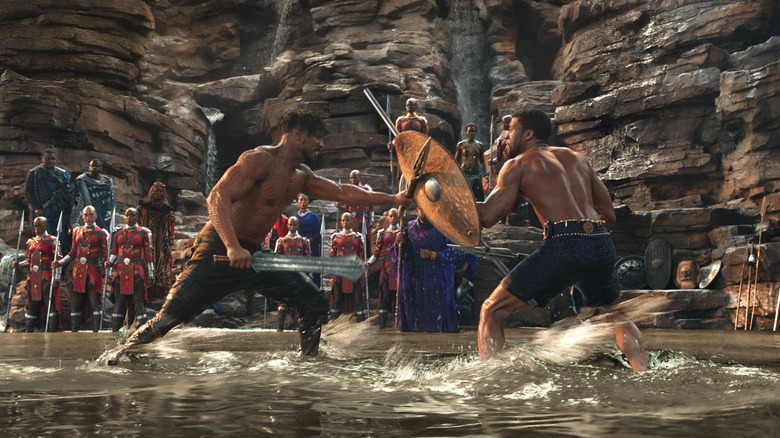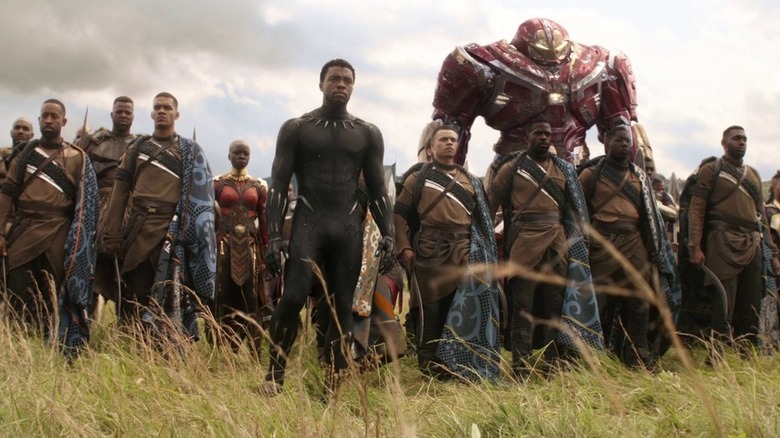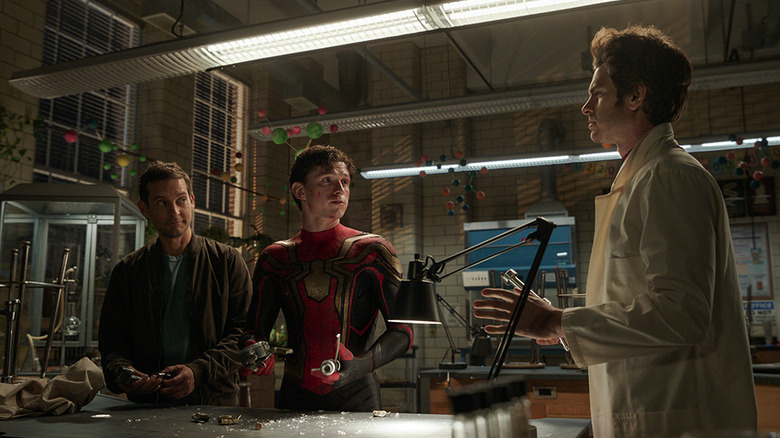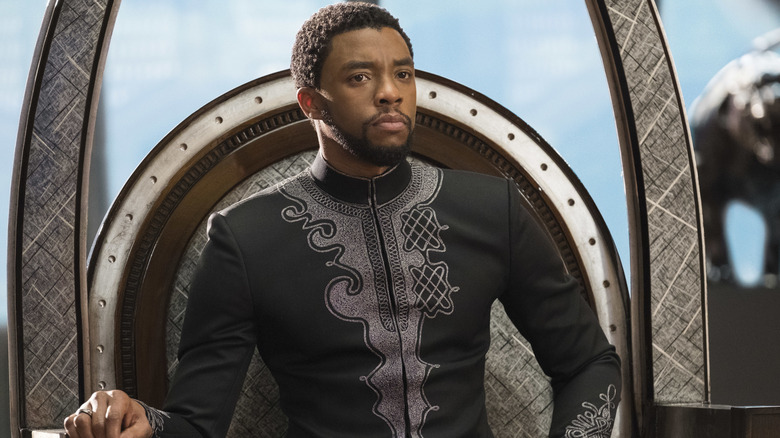What Non-Marvel Fans Need To Know To Watch Black Panther: Wakanda Forever
One of the biggest movies of the year – if not the single biggest movie of the year – is nearly upon us in the form of "Black Panther: Wakanda Forever." This is the sequel to 2018's "Black Panther," which became a downright pop culture phenomenon upon its release. The film went on to earn more than $1.3 billion at the box office, shattering records and going on to earn Marvel Studios its first Oscars, including a Best Picture nomination. That being the case, all eyes are on director Ryan Coogler's follow-up.
But a whole lot has happened in the Marvel Cinematic Universe (and in the real world) since the first movie hit theaters. As such, more casual moviegoers who are specifically interested in these films might not be up to date on all of the goings on. So, for those who are looking to get caught up fast ahead of the sequel's release, we've got you covered. Here's everything non-Marvel fans need to know before watching "Wakanda Forever."
A quick Black Panther recap
More than anything, it would be absolutely essential to be caught up on the events of 2018's "Black Panther." While the events of the MCU tend to be interconnected, the standalone sequels do also tend to work pretty much as direct sequels to the other films in the series without too much homework. Movies like "Doctor Strange in the Multiverse of Madness" and "Spider-Man: Far From Home" are more exceptions in this department rather than rules.
So, the first film in this franchise sees Chadwick Boseman's T'Challa taking over as both the King of Wakanda and the new Black Panther in the wake of his father's death during the events of "Captain America: Civil War. While there is some political unrest, things come to a head when Killmonger (Michael B Jordan) makes his way to Wakanda to claim that he is the rightful heir to the throne as an abandoned child who is, by blood right, a Wakandan. T'Challa loses his battle with Killmonger initially, paving the way for a hostile takeover.
In the end, T'Challa and Killmonger have one last battle for the fate of Wakanda, with Killmonger dying at the hands of his Wakandan brother. T'Challa is able to take back the throne, prevent a global war, and stabilize his country, but at great cost. One of the most crucial things that happens at the end of the film is that Wakanda decides to open itself up to the world, making its presence known and no longer hiding behind its shield (both literally and figuratively speaking). And that is, in a very simple nutshell, where that movie leaves us.
Avengers: Infinity War and Endgame
While, in the end, these movies didn't end up messing with the central characters of "Wakanda Forever" all that much in terms of them being alive or dead, "Avengers: Infinity War" and "Avengers: Endgame" were universe-shattering events that the MCU will be forced to address in pretty much every movie for the rest of its existence. Thanos, a big villain who was originally teased in a post-credits scene attached to "The Avengers," finally made good on his promise to try and gather all of the Infinity Stones – powerful items such as the Tesseract – that would make him the most powerful being in the universe. His goal was to wipe out half of all existence so that life could prosper, rather than suffer. The Avengers took issue with his plan.
Despite a harrowing battle that largely took place in Wakanda against Thanos' army, the Mad Titan was successful and gathered all of the stones. With the snap of his finger, he did indeed wipe out half of all life in the universe. This included T'Challa, who was dusted into oblivion. Roll credits on "Infinity War." But in "Endgame," the remaining Avengers hatched a crazy plan to travel back in time and gather the stones (which Thanos later destroyed) so that they could reverse the snap. After a big, crazy movie's worth of stuff, they are successful. A big battle ensues, and Thanos is dusted.
Most importantly, everyone who was snapped away, which is known as "the Blip" in the universe of the MCU, was brought back. This includes T'Challa, meaning he was going to be able to return to the throne as the rightful king of Wakanda. We even get a nice little final shot of him in "Endgame" overseeing his peaceful kingdom with his family. All was well.
The Marvel multiverse is opening up
Another huge thing to remember is that Phase 4 of the MCU, which kicked off with "WandaVision" and will conclude with "Wakanda Forever," has been all about opening up the multiverse. Movies like "Spider-Man: No Way Home" and "Doctor Strange in the Multiverse of Madness," as well as shows like "Loki," dealt heavily with opening up multiple universes and introducing multiple "variants" of characters we were already familiar with. So much so that the current saga in the MCU has been labeled the Multiverse Saga, meaning it will extend through Phase 5 and Phase 6 as well.
It's not too important to be concerned with phases and the specifics of those multiverse-centric projects. What is important is that if any of these multiverse conversations come up in this movie, some context may be needed. Though the marketing has not at all made it seem like this movie is going to touch on the multiverse of it all, so it doesn't feel crucially important. More like one of those things that would just be good to make note of.
The T'Challa of it all
By far the biggest thing to understand before heading into this movie has less to do with the happenings in the Marvel Cinematic Universe and more to do with real-world events that greatly impacted the movie at hand. Chadwick Boseman, who played T'Challa gracefully in the first "Black Panther," passed away in 2020 following a quiet battle with cancer. The death came as a true shock as most people weren't even aware of Boseman's illness. But that meant that Marvel Studios and Ryan Coogler had to figure out how to proceed with this multi-billion-dollar franchise.
Ultimately, Coogler opted to tell a new story that would put the focus on other characters in the world of Wakanda with someone new taking up the Black Panther mantle. Nobody was brought in to replace Boseman, as all involved felt it was best to honor the actor by letting the role stay with him. So, T'Challa's death is going to be a bit part of the movie, leaving Wakanda vulnerable as its king and protector are no longer in place. That paves the way for a battle with Namor, the leader of the underwater kingdom of Talokan. And that's about it! Anyone who is interested in seeing this film should be good to go with the preceding information.
"Black Panther: Wakanda Forever" hits theaters on November 11, 2022.




